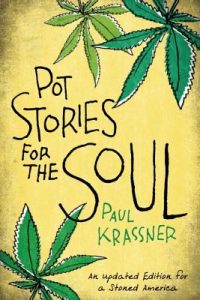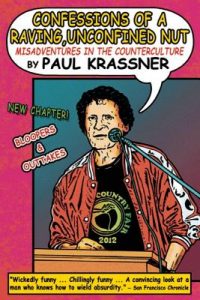Paul Krassner
Paul Krassner is an author, journalist, stand-up comedian, and the founder, editor, and a contributor to the The Realist. Krassner became a key figure in the counterculture of the 1960s as a member of Ken Kesey's Merry Pranksters and a founding member of the Yippies. He lives in Southern California.
Subscribe to our newsletter for news & events from Soft Skull Press.
Books
Pot Stories for the Soul
The pieces in Pot Stories for the Soul are funny, whimsical, bizarre, poignant, informational, shocking, and, yeah, soulful. They are about love, hate, escape, reality, the paranormal, Allen Ginsberg, Ken Kesey, Michelle Phillips, Hunter Thompson, Abbie Hoffman, Wavy Gravy and peanut butter. Ultimately, these stories reveal the wide, weird, and wonderful subculture of stoners, where the reefers are mad, the joints are fat, and the buzz lasts for six-and-a-half days.Mainstream America has had an uneasy relationship with marijuana. Once a legal substance, the 1930s saw a massive campaign against the "Devil's Harvest" that led to pot being rendered illegal. In the 1960s, marijuana became one of the defining elements of the counterculture before once again being shunted to the sidelines. Over the last decade, however, marijuana has gone mainstream and has been the topic of seminars, expos, concerts, comedy routines, movies, TV shows, and college courses across the country.
Originally published by High Times in 1999, Pot Stories for the Soul won the Firecracker Alternative Book Award and also became a Quality Paperback Book Club selection. This brand-new edition includes several new essays by Paul Krassner, plus his foreword, his afterword, and the evolution of cannabis sanity in between.
Confessions of a Raving, Unconfined Nut
Misadventures in the Counterculture
Uncensored, uncontained, and thoroughly demented, the memoirs of Paul Krassner are back in an updated and expanded edition. Paul Krassner, “father of the underground press” (People magazine), founder of the Realist, political radical, Yippie, and award-winning stand-up satirist, shares his stark raving adventures with the likes of Lenny Bruce, Abbie Hoffman, Norman Mailer, Ken Kesey, Groucho Marx, and Squeaky Fromme, revealing the patriarch of counterculture’s ultimate, intimate, uproarious life on the fringes of society.Whether he’s writing about his friendship with controversial comic Lenny Bruce, introducing Groucho Marx to LSD, his investigation of Scientology, or John Kennedy’s cadaver, no subject is too sacred to be skewered by Krassner. And yet his stories are soulful and philosophical, always authentic to his iconoclastic brand of personal journalism.
As Art Spiegelman said, “Krassner is one of the best minds of his generational to be destroyed by madness, starving, hysterical, naked—but mainly hysterical. His true wacky, wackily true autobiography is the definitive book on the sixties.”
Catapult | Counterpoint | Soft Skull
20 Jay Street #704
Brooklyn, NY 11201
646.926.0805 | contact@catapult.co
20 Jay Street #704
Brooklyn, NY 11201
646.926.0805 | contact@catapult.co






